- Home
- Brandon Sanderson
Snapshot
Snapshot Read online
a novella
BRANDON SANDERSON
CONTENTS
TITLE PAGE
One
Two
Three
Four
Five
Six
Seven
Eight
Nine
Ten
POSTSCRIPT
ACKNOWLEDGMENTS
ALSO BY BRANDON SANDERSON
COPYRIGHT NOTICE
One
Anthony Davis—one of only two real people in a city of twenty million—caught the burrito his partner tossed to him. “Which end is the mustard on?” he asked.
“Mustard?” Chaz replied. “Who puts mustard on a burrito?”
“You. What side?”
Chaz grinned, showing perfect white teeth. They were fake. After taking that bar stool to the face two years back, he’d gotten one replaced, but had insisted that the dentist make it too perfect to match his other teeth. By this point, he’d had most of the rest replaced as well.
“Mustard is in the end on your left,” Chaz said, nodding to the burrito. “How’d you know?”
Davis just grunted, ripping off the corner of the burrito. Beans, cheese, beef. And mustard. Chaz clung to this stupid belief that someday his partner would happen upon a mustardy bite and convert. Davis shook his head and tossed the ripped-off chunk of burrito into a dumpster.
The two strolled down the street in plain clothes. The vast city of New Clipperton enveloped them, so authentic that one would never be able to tell it was a Snapshot—a re-creation of a specific day in the real city. Using methods a simple cop like Davis struggled to understand, the entire city had been reproduced.
They were actually in some vast underground complex, but it didn’t seem that way to him; he saw a sun overhead and smelled the stench of the alleyway they passed. It all felt real to him. In its way, it was real: built from raw matter you could touch, smell, hear, and—as evidenced by the bite Davis took of his burrito—taste.
Damn. He’d missed some of the mustard.
“You ever wonder,” Chaz said, talking with his mouth half-full, “how much these burritos cost? Like, for real. The energy to create them and stick them in here so we can buy them?”
“They cost tons,” Davis said, then took another bite. “And nothing at the same time.”
“Huh. Kind of like how you can say things, but have them mean nothing at the same time?”
“The Snapshot Project is a sunk cost, Chaz,” Davis said. “The suits already paid for the place, the technology to do this. Everything is already here, and the setup cost was enormous. But we didn’t really have much choice.”
When the new American government had pulled out of Clipperton, they’d decided not to remove the installation built underneath it. Davis had always assumed that the Americans wanted the place to stay around, in case they decided to return and play with their experiment some more. But they also hadn’t wanted to just give it away. So, New Clipperton—officially an independent city-state—had been granted the “opportunity” to take control of the Snapshot Project. For a very large fee.
Davis took another bite of his burrito. “This whole thing cost us a ton, but that’s done. So we might as well use it.”
“Yeah, but burritos, man. They make burritos for us. I always wondered if the bean counters would figure, ‘Burritos are too frivolous. Let’s take them out.’ ”
“Doesn’t work that way. If you’re going to use the Snapshot to re-create a day, you have to do it exactly. So our burritos, the graffiti on the wall there, the woman you’re leering at—all part of the package. Expensive, but free, all at once.”
“She is fine though, eh?” Chaz said, turning around and walking backward as he watched the woman.
“Have a little decency, Chaz.”
“Why? She’s not real. None of them are real.”
Davis took another bite of burrito. His taste buds couldn’t tell that it wasn’t real. Of course, what did it mean to be “real”? The beans and cheese had been modeled on a real burrito in the real city, and it was exact down to the molecular level. It wasn’t just some virtual simulation either. If you’d placed this burrito beside one from the real world, even an electron microscope couldn’t have detected the difference.
Chaz grunted, biting into his own burrito. “Wonder who bought these in the real city.”
It was a good question. This Snapshot had been created overnight, and was an exact replica of a day ten days back: the first of May, 2018. This entire re-creation would be deleted once Chaz and Davis left for the evening. They’d push a button, and everything in here would be reconstituted back to raw matter and energy.
Chaz and Davis were real though—from “in real life,” so to speak. Their insertion—while necessary—was also problematic. As Chaz and Davis interacted with the Snapshot, they would cause what were called Deviations: differences between the Snapshot and the way the real May first had played out.
Some things they did—though it was impossible to tell which ones ahead of time—would end up having a ripple effect throughout the Snapshot, making the re-creation happen differently from the real day. The Deviation percentage—as calculated by statisticians—would be a factor in any trials associated with evidence discovered in the Snapshot.
Chaz and Davis usually left that to the bean counters. Sometimes, they’d go the entire day doing things they were sure would ruin their cases—but in the end everything played out fine, and the Deviation percentage was determined to be small. Another time, Davis had locked himself away in a hotel saferoom, determined not to create any Deviations. Unfortunately, by slamming his door, he’d woken up a woman in an adjacent room. She had therefore made it to an interview on time, and that had sent ripples throughout the entire Snapshot, causing a 20 percent Deviation level. That had cost them an entire case.
Nobody had blamed him. Cops in the Snapshot would introduce Deviations; it was the nature of what they did. Still, it haunted him. In here, everyone else was fake, but he and Chaz . . . They were somehow something worse. Flaws in a perfect system. Intruders. Viruses leaving chaos in their wakes.
It doesn’t matter, he told himself as he finished the last of the burrito. Eyes on the mission. The department shrink told him to focus on what he was doing, on his task at hand. He couldn’t function if he fixated on the Deviations.
The two made their way to the corner of Third and Twenty-Second, near rows of little shops. Convenience stores, a liquor shop with bars on the windows. The backs of the stop signs had random stickers from this band or that plastered over them. This wasn’t one of the nicer areas of the city; there weren’t many of those left.
Davis called up the mission parameters again on his phone, looking them over. “I think we should stand inside,” Davis said, gesturing toward the liquor store.
“Makes it hard to chase someone.”
“Yeah, but he won’t see us. No Deviations.”
“Deviations can’t be stopped.”
He was right. Each day, they’d be interviewed about what they did, and data from their phones—which tracked their location—would be downloaded. Their actions were audited by the bean counters in IA, but the language was always about “minimizing Deviation risk in targets.” Never about eliminating the Deviations.
Besides, the phone data could be fudged, as Davis well knew, and signals from outside had trouble reaching inside the Snapshot. So really, nobody knew for sure what they did in here.
Still, Chaz didn’t argue further as Davis positioned them inside the liquor store, which was open despite the early hour. The place smelled clean, and was well maintained, notwithstanding the unsavory section of town. A bearded Sikh man with a sharp red turban swept the floor by the checkout counter. He rega
rded them curiously as they set up near the front window.
Davis read the mission parameters again, then checked his watch. A half hour. Not much time. They shouldn’t have stopped for breakfast, despite Chaz’s complaining.
The shopkeeper continued his sweeping, eyeing them periodically.
“He’s going to be trouble,” Chaz noted.
“We’re just two normal patrons.”
“Who didn’t buy anything. Now we’re staring out the window, one of us checking his watch every fifteen seconds.”
“I’m not—”
Davis was interrupted as the shopkeeper finally set his broom aside and came walking over. “I’m going to need you to leave,” he said. “I need to close for, um, lunch.”
Davis smiled, preparing a lie to placate the man.
Chaz flashed his badge.
It looked normal to Davis. Just a silvery shield with the usual important-looking embossing. Nothing abnormal about it. Except it was a reality badge. To anyone from the Snapshot—to anyone who was a dupe, a fake person—it wouldn’t look like a normal police shield at all. Instead, it was certification that the men bearing it were real.
And equally, certification that you were not.
The Sikh man stared at the badge, eyes widening. Davis always wondered what it was they saw. They got that same far-off look in their eyes, as if they’d stared into something vast. Stunned. Even a little in awe.
Has a dupe of me ever seen one of those? he wondered. Thinking he was the real me, completely ignorant of the fact that he—and his entire world—was just a Snapshot. Until he saw the badge . . .
The shopkeeper shook himself and looked at them. “Hey, that’s a neat trick. How did you . . . I mean, how’d you make it . . .” He trailed off, looking down at the badge again.
Dupes always recognized it instinctively. Something inside them knew what the badge meant, even if they hadn’t ever heard about them. Of course, most had heard of them, with the privacy dustups recently. Beyond that, the general public up in the Restored American Union had a fascination with the project; it was becoming a favorite of cinema. You could stream half a dozen cop dramas about detectives working inside a Snapshot—though as far as Davis knew, the only official facility was here in New Clipperton.
The cop dramas never showed what the reality badge looked like. It seemed to be some kind of unwritten rule. It was better in your head.
The shopkeeper whispered something softly in his native tongue. Then he looked up at them again, more somber. Chaz nodded to him.
The shopkeeper took it well. He just . . . wandered off. He pushed out the door of his shop in a daze, leaving it all behind. Why work a retail job when you’ve just found out you aren’t real? Why bother with anything when your entire world is going to end around bedtime?
“Want anything to drink?” Chaz asked cheerfully as he tucked his badge into his front pocket. He nodded to the now-unguarded store shelves.
“You didn’t need to do that,” Davis said.
“We only have a few minutes left. No time for chitchat. This was the best way.”
“He’ll introduce Deviations.”
“There’s no way to stop—”
“Shut it,” Davis said, slumping against the window and checking his watch again. Sometimes I hate you, Chaz.
Though he envied Chaz at the same time. Davis would be better off if he could simply start viewing everything in here—even the people they passed—as fake. Puppets created from raw matter and animated for a short time.
It was just that . . . they were exact reproductions, right down to their brain chemistry. How could you not view them as real people? He and Chaz ate the burritos, treated them as real, but were at the same time supposed to pretend the people they met were nothing more than simulacra? Didn’t seem right.
Chaz squeezed him on the shoulder. “It’s better this way. He’ll be able to enjoy what’s left of his life, you know?” He dug in his pocket, then dropped a handful of change onto the windowsill. “Here. From the burrito stand.”
Chaz wandered off to dig out an India Pale Ale. Davis stewed, then checked his mission parameters. Again. Two cases today. The one out on the street corner, then another near Warsaw Street at 20:17. Deviation percentage might be high by then, particularly if Chaz was in a mood today, but they could still do some good. Help cases going on in the real world. Get information to the real cops.
And Warsaw Street. 20:17.
Davis finally took the handful of coins and began sifting through them, holding each up to the morning sunlight coming through the window, checking the date. Chaz sauntered back over, then shook his head at Davis. “We could go to a bank, you know. Ask them for an entire bucket of coins.”
“Wouldn’t count,” Davis said, frowning at the quarter he was holding. Did he have 2002, Philadelphia mint? He pulled out his phone, scrolling down.
“Wouldn’t count?” Chaz asked. “By whose rules?”
“My own rules.”
“Then change them.”
“Can’t,” Davis said. Yeah, he’d found a 2002 already. It was 2003 he needed. Hard to find a place that used coins these days. The street vendors, the occasional convenience store.
“You do realize,” Chaz said, “how much more difficult you make your life, don’t you?”
“Sometimes,” Davis admitted. “But I can’t cheat, or the collection will lose all meaning. Besides, Hal knows the rules.” Davis had gotten an email from his son last week; the kid had almost finished a complete set of the 2000s. There was a soda machine in Hal’s school that gave real-money change.
“Let’s say you find one in here,” Chaz said. “Some little bit of metal that happens to have the right stamp on it, to make you all freaked out or whatever. What would you do? We can’t take anything out of the Snapshot.”
“Unless it’s inside us,” Davis said, nodding to Chaz’s beer.
“You’d—”
“Eat the coin? Sure. Why not? What are the precinct bean counters going to do? Search my stool?”
Chaz took a long drink of beer. “You’re a strange little dude, Davis.”
“You’re only now figuring this out?”
“I’m slow,” Chaz said. “And you, you’re like subtly weird, Davis. Stealth weird.”
Davis’s watch buzzed, and he checked the time. Five minutes. He leaned in, watching the building across the street. A bar with some apartments on top.
Chaz reached for the holster under his arm.
“You won’t need that,” Davis said.
“A man can dream, can’t he?” But he did let go of the gun. “What makes this guy special anyway? A thousand murders a year in the city, and this one gets a Snapshot?”
Davis didn’t answer. Seriously, couldn’t Chaz be bothered to check the news once in a while? Or at least read the case notes?
They barely heard the shot across the street. Standing where they were, the little pop could have been almost anything. Someone flinging a bottle at a dumpster, a window breaking, even a door slamming. Davis jumped anyway.
Their perp, Enrique Estevez, hurried out of the building’s stairwell a minute later, hands shoved in his pockets. He looked around nervously, then set off down the street. Not quite at a run, but still obviously agitated.
“I’m off,” Chaz said.
“Don’t let him see you.”
Chaz gave him the look that meant, What, you think it’s my first day? Then he was out the door tailing Estevez, phone in hand.
Davis ducked out a moment later and turned down an alley, following the map on his phone toward Sixth. He would wait at the last point Estevez had been seen on the real day, in case Chaz lost the trail.
Davis called Chaz on the phone. “How’s he looking?”
“Nervous,” Chaz said over the line. “Street’s gone empty. Only a handful of people here. Should I take pictures of anyone, so the IRL cops can seek out witnesses?”
“No,” Davis said. “Too suspicious. And what
would they witness? That Estevez was on the street? Just tail him.”
“Right,” Chaz said. “Hold up. He turned toward Eighth.”
Davis stopped in place. It was the wrong direction. “You sure?”
“Yeah. Is this a problem?”
“He was seen on Sixth in a few minutes,” Davis said. “Is he turning back?”
“No, we’re heading east, crossing avenues. Seems determined now. Not looking around as much.”
Davis cursed quietly, turning on his heels and heading back along the alleyway at a swift pace. The eyewitness who claimed to have seen Estevez on Sixth was wrong—either that or a Deviation had sent their subject in the wrong direction. If the percentage was that high already, this entire Snapshot would be a wash.
“I’m moving parallel to you,” Davis said, trying to keep himself from getting nervous. “You at Eighth yet?”
“Just passed it,” Chaz said. “Damn, Davis. He ducked into an alleyway, heading south. It’s going to be really hard to follow without looking suspicious.”
They couldn’t risk that. If Estevez got suspicious, it could create a ton of Deviations in his behavior. That was one type of Deviation they could do something about.
“I’m to the south on Twenty-First now,” Davis said. “I’ll bet I can intercept him.”
He stopped on the corner at Eighth Avenue, trying to hide the fact that he was puffing from the short jog. He’d have never passed fitness requirements for IRL fieldwork. Not anymore.
Still, he’d gotten into position fast enough to catch sight of Estevez leaving an alleyway ahead. Estevez turned east along Twenty-First Street, and Davis followed.
“I’ve got him,” Davis said, strolling along, trying to look nonchalant. Just another guy talking on his phone. Nothing to notice or worry about.
Damn. He was already feeling nervous. Stupid. This was a simple chase. He could do this without becoming a wreck.
“Nice work,” Chaz said. “I’m heading east on Twenty-Second, parallel to you.”

 Steelheart
Steelheart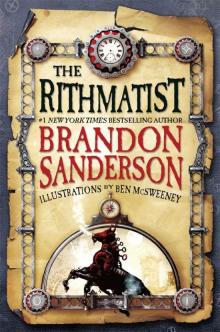 The Rithmatist
The Rithmatist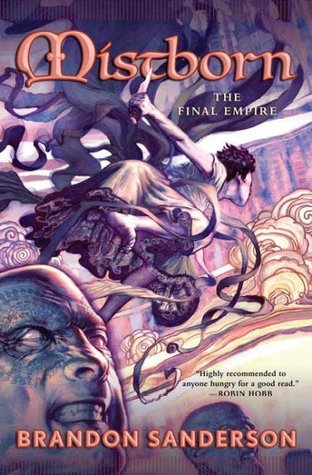 Mistborn: The Final Empire
Mistborn: The Final Empire Oathbringer
Oathbringer The Way of Kings
The Way of Kings Redemption
Redemption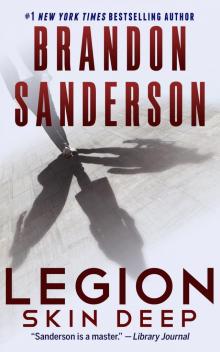 Skin Deep
Skin Deep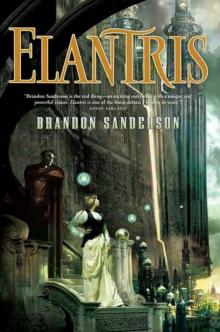 Elantris
Elantris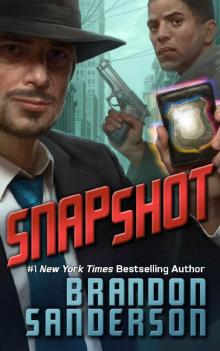 Snapshot
Snapshot Sixth of the Dusk (Cosmere)
Sixth of the Dusk (Cosmere)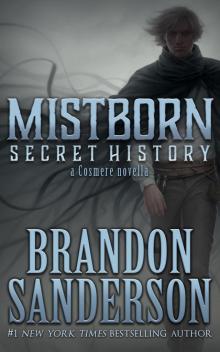 Mistborn: Secret History
Mistborn: Secret History White Sand, Volume 1
White Sand, Volume 1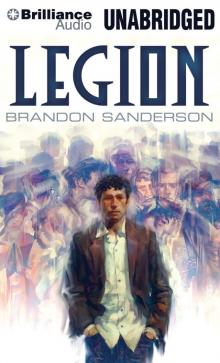 Legion
Legion The Well of Ascension
The Well of Ascension The Bands of Mourning
The Bands of Mourning Words of Radiance
Words of Radiance The Hero of Ages
The Hero of Ages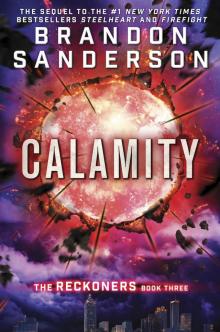 Calamity
Calamity Alcatraz Versus the Scrivener's Bones
Alcatraz Versus the Scrivener's Bones The Alloy of Law
The Alloy of Law The Emperors Soul
The Emperors Soul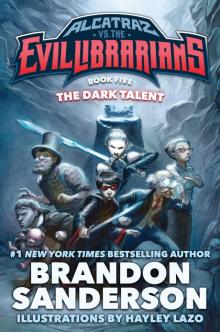 The Dark Talent
The Dark Talent The Gathering Storm
The Gathering Storm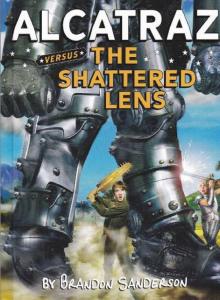 Alcatraz Versus the Shattered Lens
Alcatraz Versus the Shattered Lens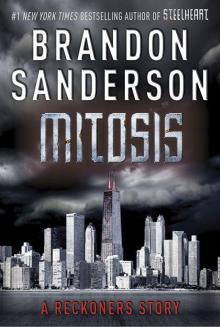 Mitosis
Mitosis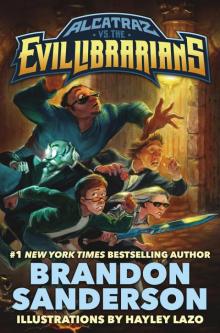 Alcatraz vs. The Evil Librarians
Alcatraz vs. The Evil Librarians Rhythm of War (9781429952040)
Rhythm of War (9781429952040)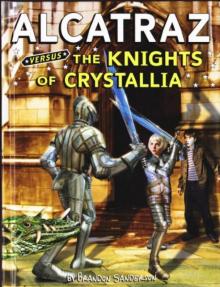 Alcatraz Versus the Knights of Crystallia
Alcatraz Versus the Knights of Crystallia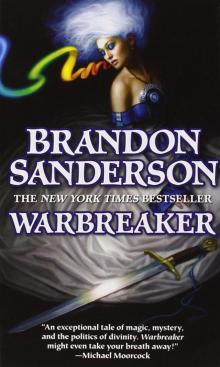 Warbreaker
Warbreaker Firstborn
Firstborn Starsight
Starsight Edgedancer
Edgedancer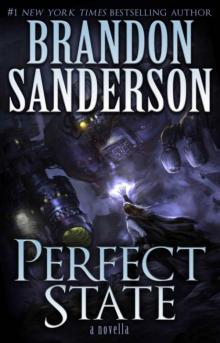 Perfect State
Perfect State Shadows of Self
Shadows of Self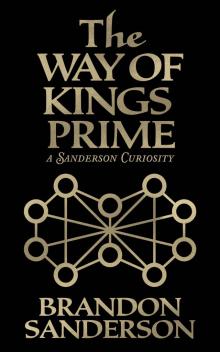 The Way of Kings Prime
The Way of Kings Prime Starsight (US)
Starsight (US) Shadows for Silence in the Forests of Hell
Shadows for Silence in the Forests of Hell Arcanum Unbounded: The Cosmere Collection
Arcanum Unbounded: The Cosmere Collection Awakening
Awakening Firefight
Firefight Dawnshard
Dawnshard Defending Elysium
Defending Elysium White Sand
White Sand Infinity Blade: Redemption
Infinity Blade: Redemption The Final Empire
The Final Empire Skyward
Skyward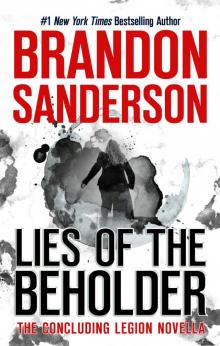 Lies of the Beholder
Lies of the Beholder Elantris e-1
Elantris e-1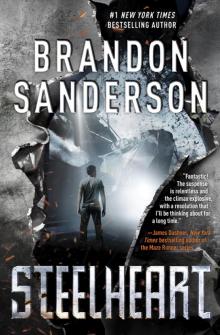 Steelheart r-1
Steelheart r-1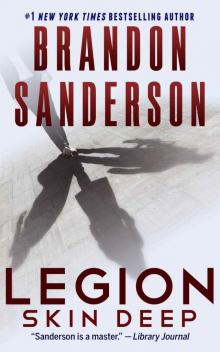 Legion: Skin Deep
Legion: Skin Deep Well of Ascension
Well of Ascension Mistborn
Mistborn Alcatraz versus the Evil Librarians
Alcatraz versus the Evil Librarians The Final Empire m-1
The Final Empire m-1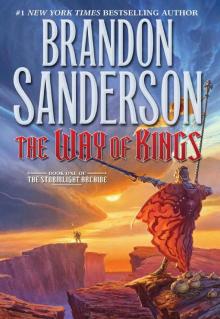 The Way of Kings (Stormlight Archive, The)
The Way of Kings (Stormlight Archive, The)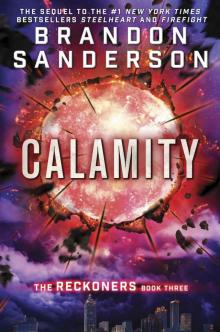 Calamity (The Reckoners)
Calamity (The Reckoners) Legion and the Emperor's Soul
Legion and the Emperor's Soul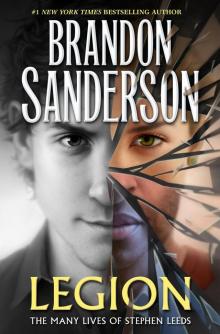 Legion: The Many Lives of Stephen Leeds
Legion: The Many Lives of Stephen Leeds The Mistborn Trilogy
The Mistborn Trilogy Bands of Mourning
Bands of Mourning Alcatraz
Alcatraz The Hero of Ages m-3
The Hero of Ages m-3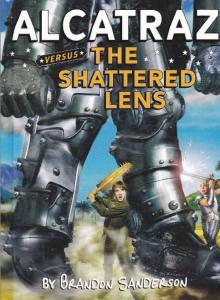 Alcatraz vs. the Shattered Lens
Alcatraz vs. the Shattered Lens The Alloy of Law: A Mistborn Novel
The Alloy of Law: A Mistborn Novel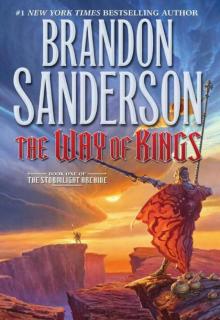 The Way of Kings sa-1
The Way of Kings sa-1 Infinity Blade: Awakening
Infinity Blade: Awakening Sixth of the Dusk
Sixth of the Dusk The Stormlight Archive
The Stormlight Archive The Aether of Night
The Aether of Night